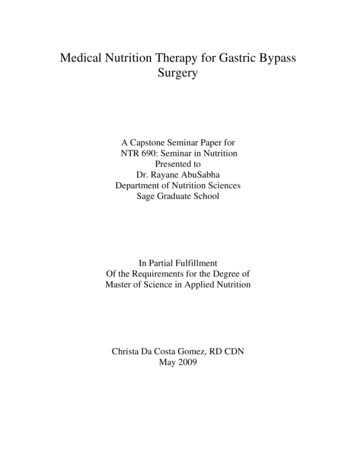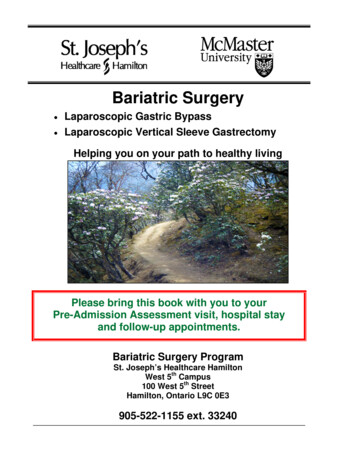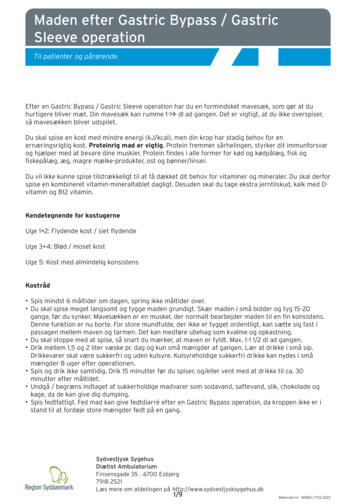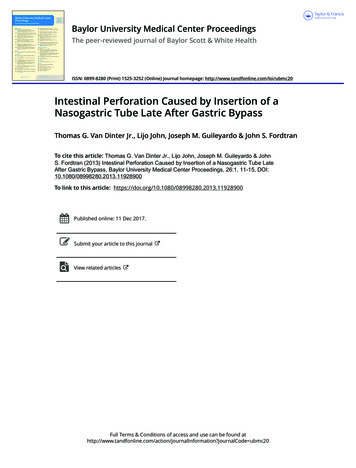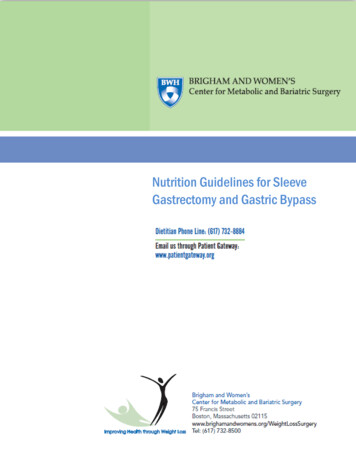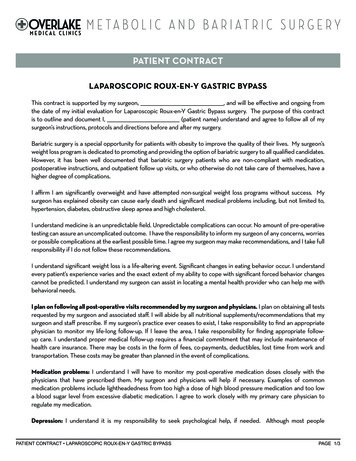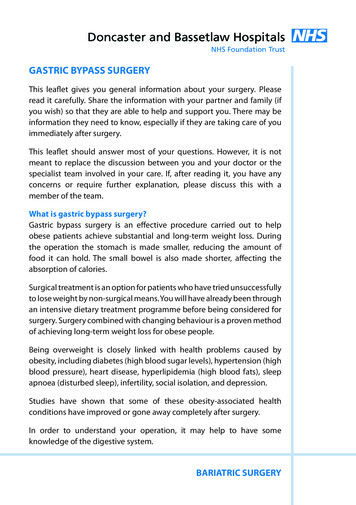
Transcription
GASTRIC BYPASS SURGERYThis leaflet gives you general information about your surgery. Pleaseread it carefully. Share the information with your partner and family (ifyou wish) so that they are able to help and support you. There may beinformation they need to know, especially if they are taking care of youimmediately after surgery.This leaflet should answer most of your questions. However, it is notmeant to replace the discussion between you and your doctor or thespecialist team involved in your care. If, after reading it, you have anyconcerns or require further explanation, please discuss this with amember of the team.What is gastric bypass surgery?Gastric bypass surgery is an effective procedure carried out to helpobese patients achieve substantial and long-term weight loss. Duringthe operation the stomach is made smaller, reducing the amount offood it can hold. The small bowel is also made shorter, affecting theabsorption of calories.Surgical treatment is an option for patients who have tried unsuccessfullyto lose weight by non-surgical means. You will have already been throughan intensive dietary treatment programme before being considered forsurgery. Surgery combined with changing behaviour is a proven methodof achieving long-term weight loss for obese people.Being overweight is closely linked with health problems caused byobesity, including diabetes (high blood sugar levels), hypertension (highblood pressure), heart disease, hyperlipidemia (high blood fats), sleepapnoea (disturbed sleep), infertility, social isolation, and depression.Studies have shown that some of these obesity-associated healthconditions have improved or gone away completely after surgery.In order to understand your operation, it may help to have someknowledge of the digestive system.BARIATRIC SURGERY
Understanding digestionFrom the mouth, food passes through the oesophagus (gullet) intothe stomach, where it remains for several hours during digestion andis broken down into a semisolid form. It then passes intooesophagusthe small bowel where furtherdigestion and absorption ofnutrients takes place. TheStomachremaining digestive productcontinues into the colon (largebowel) where some waterSmall bowelabsorption occurs and then itpasses from the body as waste,Large bowelknown as faeces.RectumAnusIs gastric bypass surgery theright choice for me?Gastric bypass surgery workswell for people who have large portions, as their intake will be greatlyreduced because of the new small pouch-like stomach. It also works wellfor people who enjoy snack through the day as it often reduces yourdesire to eat sweet and sugary food.How does gastric bypass work?The operation, which is usually performed by keyhole surgery(laparoscopically), involves making the stomach smaller. A small gastricpouch is formed, approximately the size of an eggcup. This involvesplacing staples across the upper part of the stomach to form the smallpouch and divide it from the rest of the stomach. The small bowel isthen divided 80cm or so from its top and then attached to the new smallgastric pouch. Food now passes into the pouch and then into the smallbowel. The divided end of the bowel, which is attached to the originallarge stomach, is then re-attached 80-100cm below where the other endis joined to the gastric pouch.This ensures gastric and pancreatic juices meet the food and digestionoccurs.BARIATRIC SURGERY
StomachBy-passedstomachStomachHow does the operation affect eating?You will need to make changes to your diet after your operation. In doingthis, you will be supported by the specialist dietitian. For your operationto be effective and to maximise weight loss, it is important that you makelife-long changes to your diet and lifestyle. You must be committed tomaking changes and following the guidance that you are given by yoursurgeon and the rest of the medical team. You should not consider thistreatment if you do not feel able to make these commitments.Remember surgery can only be successful if you commit to making thenecessary dietary and lifestyle changes. The operation is only a tool toassist you to lose weight; the success depends on you.What diet will I have to follow once I have had the operation?The dietitian will visit you on the ward to discuss your diet followingyour operation. You will be provided with a diet sheet. After this, youmay be required to follow a fluid only diet for a short period followedby a pureed diet, then onto a soft diet and finally a normal textured diet.Progress through the stages varies between individuals. It is importantnot to try to move through the stages too quickly as you are more likelyto suffer from vomiting.The diet you should follow long-term will be a diet low in fat and sugar.Your dietitian will provide you with dietary guidance and ongoingsupport and advice individual to your needs and progress. It is importantto maintain regular contact with your dietitian before and after theoperation.BARIATRIC SURGERY
What are the benefits of having gastric bypass surgery?The operation helps you to achieve long-term weight loss.Achieving and maintaining significant weight loss reduces healthrelated problems such as: type 2 Diabetes hypertension (high blood pressure) coronary heart disease osteoarthritis high cholesterol obstructive sleep apnoea (difficulty breathing at night).Keyhole (laparoscopic) surgery has the benefits of: smaller incisions (cuts) reduced pain reduced risk of infection shorter hospital stay.What are the risks and complications associated with having gastricbypass surgery?Most people have few problems during and after surgery. However,sometimes there may be complications or difficulties.As with any surgery, gastric bypass has risks, which include: thrombosis (blood clot) heart attack internal bleeding post operative wound infection chest infection risk of not surviving due to problems occurring at operation (rare).Additional risks associated specifically with this surgery are: a leak in the joins between the new stomach pouch and small bowel a blockage or a narrowing in the joins between the new stomachpouch and small bowel wound infection hernia.BARIATRIC SURGERY
The chance of these risks and complications is small. However, it isimportant that you understand and are aware of them and have all theinformation you need before agreeing to surgery. It may be necessaryto change to open surgery (larger incision) if it proves impossible toperform your surgery laparoscopically.What happens before surgery?Before being referred for surgery, you will have already tried to reduceyour weight and alter your eating habits. This process will have beensupported by your GP and/or specialist dietitians in the community.You may have already been to an information seminar led by thesurgeons, specialist nurses, and dietitians to give you details of potentialsurgery, lifestyle changes, diet and long-term outcomes. This may havealso provided you with an opportunity to meet other people, who arealso considering weight loss surgery.Outpatient appointmentAt your first outpatient appointment, you will meet the surgeon, dietitian,and specialist nurse. They will examine you and discuss the operation,if surgery is a suitable option for you. It will also be possible to have aconsultation with a psychologist during your outpatient visit. Afterthis initial assessment, your care and treatment plan will be discussedwith the wider Multi-disciplinary Team (MDT), which also includes ananaesthetist and endocrinologist.Pre-operative assessmentIf surgery is a safe and suitable option, you will attend the pre-operativeassessment clinic where full details of your medical history are taken androutine pre-operative tests and examinations are completed.These will include: blood tests, ECG (heart trace), and weight, if this hasnot already been recorded at your outpatient appointment. You maybe seen and examined by the anaesthetist at this time so that they canprepare for your anaesthetic. Full verbal and written information relatedto your surgery will be given to you. You will also receive instructions onhow and when to go on to the pre-operative liver-reducing diet.BARIATRIC SURGERY
We recommend that you stop smoking before your operation as smokingincreases your risks during anaesthetic. The pre-operative assessmentnurse will give you information to help you stop smoking.Pre-operative liver reducing dietYou will be advised by your dietitian to follow a specific diet duringthe two weeks before your operation. The aim of this diet is to reducethe glycogen stores in the liver and so reduce the size of your liver. This‘liver-shrinking’ diet makes it easier for the surgeon to get access toyour stomach and perform the operation and reduces the risks of theanaesthetic.It is very important this diet is strictly followed.You may be tempted to have a special or larger meal before surgery, butthis will reverse the effects of the diet. If you do not follow this diet, itmay not be possible to perform the operation.Before the operation, you should do your best to lose weight and dosome physical activity where possible. This will help you to be healthy forsurgery and decrease complications after surgery. You will have had theopportunity to speak to the surgeon, specialist dietitian, and specialistnurse about the operation where your questions and concerns will havebeen addressed.What happens on admission to hospital?You will be admitted to hospital either the day before your surgery or onthe morning of your surgery, depending on what you have been told atyour pre-operative assessment visit.You will be offered a bed in a side room on the ward or in a bay with twoor three other patients. You may be on a ward where there are both maleand female patients but there will only be patients of the same sex inindividual bays.On admission to the ward, the doctors and nurses will answer any furtherquestions you may have. A nurse will check that there have been noBARIATRIC SURGERY
significant changes in your health since your pre-operative assessment,and your temperature, pulse, and blood pressure will be recorded.Other health professionals may see you before surgery, including theanaesthetist, pharmacist, or physiotherapist. You may be asked if medicalstudents may be involved in your care. You do not have to agree to this.Before going to the operating theatre, you will be asked to put on a gownand compression (antiembolic) stockings that promote blood flow in thedeep veins in your legs and so reduce the risk of developing blood clots.You will be asked to continue to wear these for approximately six weeksafter your surgery or until you have regained your full mobility.What type of anaesthetic will I have?You will have a general anaesthetic for your surgery, which means youwill be asleep throughout the procedure. The anaesthetist will discussyour anaesthetic and any potential risks and complications with youbefore the operation.What I should expect after the operation.From the operating theatre, you will be transferred to the theatrerecovery room where you will wake up from your anaesthetic and thenbe taken to the ward for further recovery. It may be necessary for somepatients to initially spend some time in the Department of Critical Care(DCC). More intensive nursing and observation is provided in DCC.Patients with sleep apnoea and/or respiratory complications may go toDCC from theatre. The possibility of this will have been discussed withyou at your pre-operative assessment appointment.Immediately after the operation, you will be monitored closely by thenursing and medical staff. Your pulse, blood pressure, breathing, andwounds will be checked regularly and you may receive oxygen until youare fully awake.You will have an intravenous infusion (drip) in your arm to give you fluidsuntil you are able to take fluids by mouth. Sometimes anaesthetic makespeople feel sick so it is important that you tell the nurses if you do. Theywill offer you an injection to help settle the sickness.Most patients who have this operation will have some pain after thesurgery. It is important you tell the nurses if you are in pain and you willbe given pain killers, either by an injection or orally.BARIATRIC SURGERY
You will be encouraged to get out of bed and move around on the sameday as your operation. It is very important to move around as soon aspossible after surgery in order to reduce the risk of blood clots andprevent problems with your chest.The dietitian will visit you on the ward to discuss your diet and provideyou with written information. The dietitian will also discuss how youwill now need to eat, increasing your intake gradually and changing theconsistency of the foods you are eating over time.You will attend regular appointments with the dietitian after youroperation in order to help you adjust your diet and maximise yourweight loss.Going home from hospital – what do I need to know?Most patients will be able to go home 3-4 days after surgery, thougheveryone is different and some may require a longer hospital stay.Your abdominal area is likely to feel sore and bloated for a few weeks. Thisis normal. During this time, and as you need them, take the painkillersgiven to you by the hospital or a mild painkiller, such as paracetamol. Itis important to check your wound sites for signs of infection (pain, heat,and redness). You must see your GP if you are concerned about yourwound sites.Following your discharge from hospital, you will probably feel tired andneed to rest but this will improve. It will normally take approximately 3-6weeks for you to resume your normal activities. You should avoid liftinganything heavy for four weeks.You must not drive until you can wear a seat belt comfortably and youare able to do an emergency stop. It is advisable to check with your owncar insurance company first.As you begin to feel better, you must incorporate gentle exercise intoyour daily routine, such as walking or swimming. As you start to loseweight, you will feel more energetic and able to undertake more exercise.Sexual activities may be resumed once it is comfortable for you.BARIATRIC SURGERY
What medication will I need?When you are discharged from hospital, you will be given a supply of bloodthinning injections to be given each day for 10 days after your operation.These are small injections into the skin of your abdomen. Usually you willbe taught by the nursing staff to give these injections yourself.If some of the tablets you take are too large, the pharmacist or doctors maychange these to dissolvable or chewable tablets or give it in syrup form.If you are on medication for diabetes or high blood pressure, you mayneed to have regular checks with your GP or practice nurse to monitoryour condition and medication accordingly.You will be required to take mineral and vitamin supplements and thedietitian will discuss this with you before and after surgery. You will alsoneed to have vitamin B12 injections once every three months for the restof your life. This can be arranged by your GP and given to you by yourpractice nurse.What will my follow up care be?You will be asked to attend the outpatient clinic approximately six weeksafter your operation. This is so that the team can assess your recovery.Following this, you will be seen by the nurse specialist and the dietitianat three months, six months, nine months,12 months, and two years.After two years, you will be discharged back to your GP and local weightmanagement service.You will be given the telephone number of the specialist nurse and thedietitian to contact for any advice you may need at any other time.Is there any other support available?Doncaster’s bariatric surgery support group meets once a month. Thisgroup is open to all patients who have had weight loss procedures andthose awaiting them. It is a friendly informal meeting where patientsdiscuss their experiences with each other. For dates and times, contactyour nurse specialist.BARIATRIC SURGERY
How this surgery and weight loss will affect my life?As you start to lose weight after your surgery, you can expect to feelmuch healthier. However, you must remember that these changes willaffect your everyday life, in terms of going out for meals, buying clothes,going on holiday, etc. Support from your family and friends is importantwhile you make adjustments to changes in your life.Many patients, who lose a large amount of weight, will have loose skin,usually around the stomach and at the tops of the arms and legs. YourGP will need to refer you separately to a plastic surgeon if this skin is tobe removed. This plastic surgery is not part of the gastric bypass surgeryagreement and is not guaranteed once you start to lose weight. It isimportant to remember that this will only be considered when enoughweight has been lost and is being maintained.For our female patients, we advise you not to become pregnant until atleast two years after your operation as your body needs an appropriateamount of time to adjust. If you are planning to become pregnant, it isimportant that the doctors, midwives, and dietitians are aware that youhave had gastric bypass surgery.ContactsClinical Nurse SpecialistTelephone: 01302 366666 ext 4294Mobile: 07766 070570Specialist DietitianTelephone: 01302 366666 ext 4110Mobile: 07887 503428Secretary to Bariatric Consultant SurgeonTelephone: 01302 647234Useful websites for further information:www.bospa.org – British Obesity Surgery Patients Association/www.british-obesity-surgery.org – British Obesity and Metabolic SurgerySociety.BARIATRIC SURGERY
Patient Advice & Liaison Service (PALS)PALS staff are available to offer advice or information on healthcarematters. The office is in the Main Foyer (Gate 4) of Doncaster RoyalInfirmary. Contact can be made either in person, by telephone or email.PALS staff can also visit inpatients on all Trust sites.The contact details are:Telephone: 01302 553140 or 0800 028 8059Minicom (Text talk): 01302 553140Email: pals.dbh@dbh.nhs.ukThis information is available in other languages and formats, on request.BARIATRIC SURGERY
WPR32681July 2012BARIATRIC SURGERY
What is gastric bypass surgery? Gastric bypass surgery is an eff ective procedure carried out to help obese patients achieve substantial and long-term weight loss. During the operation the stomach is made smaller, reducing the amount of food it can hold. The small bowel is also made shorter, aff ecting the absorption of calories.

